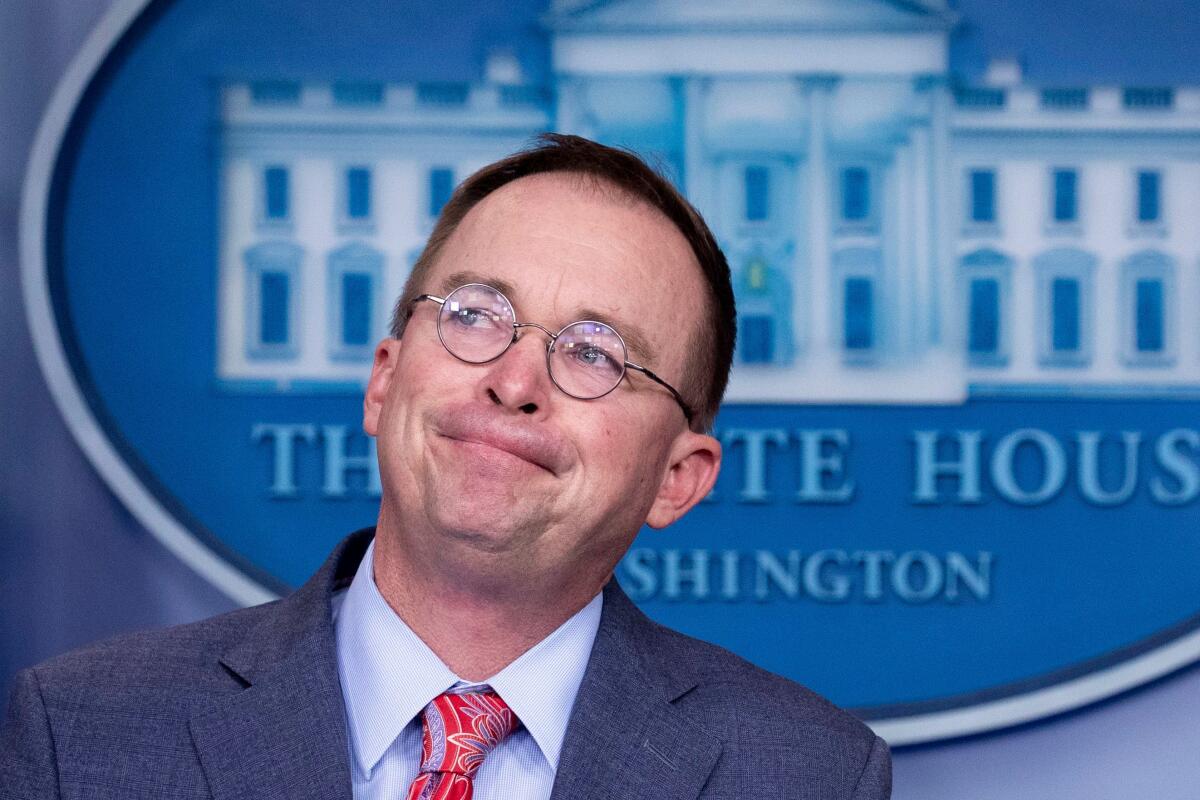Column: Here are all the reasons CBS should never have hired Trump aide Mick Mulvaney for its newscast

Staff members at CBS News are in an uproar over the venerable news department’s hiring of former Trump White House chief of staff Mick Mulvaney as a news commentator.
Their indignation is understandable and proper. Mulvaney, a long-time Republican functionary, distinguished himself during his tenure in the administration as a loyal Trump lackey.
He showed a micron-deep understanding of political and economic issues even when he served as Trump’s budget director and acting director of the Consumer Financial Protection Bureau.
If he loses, Trump will bow out gracefully.
— Mick Mulvaney, the new political commentator for CBS, showing how well he knew Trump in 2020
But he displayed a bottomless capacity to promote Trump’s political goals, which boiled down the evisceration of federal programs aimed at helping the average American.
We’ll get into the details in a moment. But first, let’s examine the explanation that CBS brass offered to the network’s news staff when they questioned Mulvaney’s hiring.
Get the latest from Michael Hiltzik
Commentary on economics and more from a Pulitzer Prize winner.
You may occasionally receive promotional content from the Los Angeles Times.
“Being able to make sure that we are getting access to both sides of the aisle is a priority because we know the Republicans are going to take over, most likely, in the midterms,” CBS News co-president Neeraj Khemlani told staff members, according to the Washington Post’s Paul Farhi, who was working from a bootlegged recording of the meeting. “A lot of the people that we’re bringing in are helping us in terms of access to that side of the equation.”
This is, of course, absurd. CBS is perfectly entitled to hire as many lobbyists as it wishes to make its case on Capitol Hill; putting them on the air, in essence to lobby the public, is another matter entirely. One question it raises is what value Mulvaney brings to the table. He’s hardly a neutral voice, but if he’s on the air merely to present his partisan slant, who needs him? Don’t we get enough of that from elected politicians?
To be fair, CBS isn’t the only news organization trying to curry favor in this way. In the old days, political types offering nothing but spin would be thrown out of the press room; now they’re given a well-paid sinecure to provide “balance.”
What Khemlani doesn’t appreciate — or maybe he does and doesn’t care — is that the quest for “access” has become the scourge of American journalism.
“I am the acting director of the CFPB,” Mick Mulvaney told a group of bankers Tuesday, “something that’s apparently keeping Elizabeth Warren up late at night, which doesn’t bother me at all.”
It’s what produces puff pieces about political insiders (they’re known in the trade as “beat sweeteners”) and softball questions for politicians on the Sunday TV news programs.
TV news has become expert at taking people at their own level of self-esteem. What that fails to produce, however, is incisive news coverage of the sort crucial to the workings of our democracy.
So here comes Mick Mulvaney, introduced for his first appearance as a CBS commentator by anchor Anne-Marie Green to deliver his opinion of President Biden’s proposed billionaires income tax.
“So happy to have you here,” Green fawned. “You’re the guy to ask about this.” The burden of her introduction was that Mulvaney was a Man Who Knows, but with his first words he acknowledged that he didn’t know anything more about the billionaires tax than was embodied in Biden’s own proposal; beyond that, his analysis was largely dismissive and, more to the point, indistinguishable from what one might hear from any GOP politician. (Mulvaney served as a Republican congressman from South Carolina from 2011 to 2017.)
Now let’s take a closer look at Mulvaney’s qualifications to opine about public issues. He was always someone who never let facts get in the way of partisan goals.
Start with his appearance in March 2017 on the CBS Sunday program “Face the Nation,” when he was director of the Office of Management and Budget in Trump’s White House. As I reported at the time, Mulvaney took the opportunity to deliver a drive-by shooting of some the nation’s neediest and most defenseless people: the disabled.
“Let me ask you a question,” he said to the moderator, John Dickerson, at the close of a seven-minute interview. “Do you really think that Social Security disability insurance is part of what people think of when they think of Social Security? I don’t think so. It’s the fastest-growing program. It grew tremendously under President Obama. It’s a very wasteful program, and we want to try and fix that.”
Dickerson’s response to this volley of lies and disinformation, in its entirety, was: “OK, we’re going to have to end it there.”
Far be it from Dickerson to challenge someone who might be useful for providing “access.”
If he were prepared to interview Mulvaney over matters of substance, however, he might have pointed out that, first, the disability insurance program has been part of Social Security since 1956, when it was signed into law by Dwight D. Eisenhower, a Republican president. He might have pointed out that Social Security is structured as both a retirement and an insurance program and has been since its enactment in 1935.
Dickerson might even have pointed out that Mulvaney was wrong to say disability was the “fastest-growing program.” At the time, the disability rolls were not only not growing, but shrinking, and had been for more than two years. (The trend has continued up to the present day.)
Not only was the program not “wasteful,” it had one of the lowest error rates of any government program — well below 1% of all benefits, as then-Acting Social Security Commissioner Carolyn Colvin had testified to Congress in 2012.
Appearing Sunday on the CBS program “Face the Nation,” President Trump’s budget director, Mick Mulvaney, engaged in a drive-by shooting of some the nation’s neediest and most defenseless people: the disabled.
Mulvaney showed his commitment to sound government administration after Trump named him acting director of the Consumer Financial Protection Bureau in 2018.
As one of his first acts in office, he went to a convention of credit union executives and boasted: “I am the acting director of the CFPB, something that’s apparently keeping Elizabeth Warren up late at night, which doesn’t bother me at all.”
Warren, you see, had conceived of the CFPB before her election to the Senate from Massachusetts in 2012 and had been its major defender in Congress since its founding. She had raised hell over several steps Mulvaney’s CFPB had suddenly taken to scrap regulatory initiatives against abusive payday lenders.
Among them was a regulation, five years in the making, aimed at preventing payday lenders and other profiteers from lending to customers who they knew would be unable to repay the loans, as well as running up fees on customers and engaging in other abuses.
Mulvney abruptly withdrew, without explanation, a federal lawsuit against four allegedly abusive installment lenders. And he closed an investigation into World Acceptance Corp., a payday lender in his home state of South Carolina that had been accused of abusive practices, but had contributed at least $4,500 to his congressional campaigns.
To Mulvaney, Warren’s objections to this deliberate enfeeblement of his agency’s authority were grist for a comedy turn, offered for the amusement of the very financial services executives he was supposed to regulate. He saw his role as head of a consumer protection agency as protecting not only consumers, but the lenders from whom consumers needed protection.
“We are there to help protect people who use credit cards,” he told the credit union executives. “We’re also there to help and protect the people who provide that credit.”
As Trump’s chief of staff, Mulvaney spent his time trying to polish Trump policies. One might expect a politician’s chief of staff to try to make his boss look good, but the policies he was defending don’t speak well of Mulvaney’s character.
Jumping off the sinking S.S. Trump isn’t an action worthy of praise.
In February 2020, he appeared at the American Conservative Union’s CPAC conference to assert that news coverage of the emerging COVID pandemic was nothing but an effort “to bring down the President. That’s what it’s all about.” It’s almost certain that the White House knew at the time that the pandemic was a serious threat to public health.
On Nov. 7, 2020, Mulvaney’s name appeared above a Wall Street Journal op-ed in which he assured readers, as the headline put it, “If He Loses, Trump Will Concede Gracefully.” That was four days after the election, when it was already clear that Trump had lost. “I’m familiar with his manner and style and know a little about how he thinks,” Mulvaney claimed, based on his 15 months in the Trump White House.
That’s a claim that, to say the least, hasn’t aged gracefully.
To bring Mulvaney’s judgment into present-day context, he also defended Trump’s attempt to strong-arm Ukraine President Volodymyr Zelensky into investigating Joe Biden’s son Hunter by implying he otherwise would withhold U.S. aid to the country.
Asked at a press conference whether Trump was proposing a “quid pro quo,” Mulvaney answered, “We do that all the time with foreign policy.” Trump would be impeached for this scheme.
Put it all together, and it suggests that there is good reason to put Mulvaney before the audience of CBS News.
CBS should put him on the air to explain why he lied about the coronavirus threat in 2020, and what made him think that Trump would bow out “gracefully” after losing the 2020 election.
And why he thought it acceptable to extort a friendly country for purely personal partisan ends. And why he viewed the Consumer Financial Protection Bureau as a shield for lenders, not consumers.
That’s an appearance I’d like to see. But for CBS, unfortunately for us, that would be an obstacle to “access.”
More to Read
Get the latest from Michael Hiltzik
Commentary on economics and more from a Pulitzer Prize winner.
You may occasionally receive promotional content from the Los Angeles Times.











